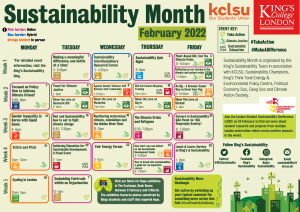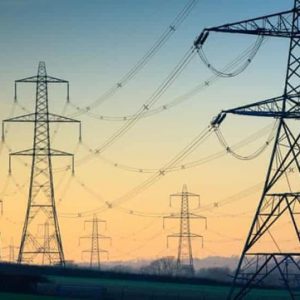King’s Sustainability Month is taking place again this February, 2022!
Sustainability Month is a collaboration between King’s and KCLSU that offers all those involved an opportunity to learn more about sustainability topics, collaborate and connect with others from across King’s and #TakeAction on climate crisis.
Download the calendar with embedded links here or view the full list below (the list below is the most up-to-date).
Week 1:
- 31st (3.30-5pm, online): A World We Want to Create – A Vision for the Future
- 1st (3-3.45pm, online): Making a meaningful difference, one bottle at a time!
- 2nd (12-13pm, online): From Paris is Burning to #dragrace: Social media and the celebrification of drag culture (LGBTQ+ History Month)
- 2nd (2-4.30pm, hybrid): Sustainability Interdisciplinary Research Forum
- 2nd (4.30-6pm, hybrid): The Importance of Knowing your Queer Herstory Through the Ages (LGBTQ+ History Month)
- 3rd (6-8pm, online): Sustainability Quiz Night
- 4th (12-12.30pm, online): Plant-Based KCL – End The Climate Crisis
- 4th (1-1.55pm, online): Reflecting on our stories in the climate and nature crisis
Week 2:
- 7th (6.30-8pm, online): Addressing the Climate Crises from a Policy Perspective
- 8th (10-11am, online): King’s Climate Action Network Plenary
- 8th (1-3pm, online): Panel for Climate Justice
- 8th (2-4pm, in person): Show the Love at Denmark Hill
- 9th (1-2.30pm, in person): Against Gender Violence – Self-Defence and Taekwondo
- 9th (11am-1pm, in person): Show the Love at Waterloo
- 10th (11am-2pm, online): SDG Curriculum Mapping Training w/ SOS-UK
- 10th (2-4pm, in person): Show the Love at Guy’s
- 11th (12-12.45pm, online): No Dig – A Greener Easier way to Grow your veg
- 11th (2-4pm, in person): Show the Love at Strand
Week 3:
- 14th (4-6pm, in person): Gender inequality in Korea with Squid Game
- 15th (6.30-7.30pm, online): Diet and Sustainability – how to eat to fight climate change
- 16th (12-2pm, in person): Weathering waterways – climate, colonialism and the hidden River Fleet
- 16th (1-2pm, online): Proudly King’s History Month Quiz! Lunchtime social (LGBTQ+ History Month)
- 16th (6-9pm, online) and 17th (6-9pm, online): Seminars on environmental education debate strategies to teach for a sustainable future (Brazil Week)
- 16th (6-8pm, in person): Climate, environment and security in the Amazon rainforest (Brazil Week)
- 17th (6.30-7.30pm, online): The Climate Crisis and Refugees
- 18th (5-6.30pm, in person): Amazon deforestation in the context of international relations of Brazil (Brazil Week)
- 18th (6-7.30pm, online): Careers in Sustainability Q&A Panel (w/ KCL Geography Society)
Week 4:
- 21st (11am-12pm, in person): Stitch and Pitch
- 21st (2-3pm, online): QCGBF Virtual Seminar Series – The Macroeconomic Cost of Climate Volatility (by QCGBF)
- 22nd (2-4pm, online): Achieving Education for Sustainable Development – A Panel Event
- 22nd (6-7pm, online): How to break into sustainability – a guide for an impactful career
- 23rd (2-4pm, online): Fair Energy Forum
- 24th (3-4.30pm, online): Digital Sustainability – How any start-up with an online presence can deliver on the UN Sustainable Development Goals
- 24th (all day, online): London Student Sustainability Conference
- 25th (11am-12pm, online): LGBTQ+ Inclusivity in STEM (and beyond) (LGBTQ+ History Month)
- 25th (1-2pm, online): Lunch & Learn – Service at King’s & Sustainability
Week 5:
- 28th (11am-2pm, in person): Cycling in London
- 28th (1-2pm, online): Proudly Lunch & Learn: Creating sex, gender and biology (LGBTQ+ History Month)
- 1st of March (12-1pm, online): Embedding Fairtrade within an Organisation
Throughout the month:
- Visit our Shots for Hope exhibition in The Exchange, Bush House between 2 February and 3 March. The exhibition features photos submitted by Kings students and staff that inspired hope.
- King’s Move challenge: get active by switching up your typical commute for something more active this February.
- LGBTQ+ History Month is also taking place in February: a month-long annual celebration of lesbian, gay, bisexual trans, and non-binary history, including the history of LGBTQ+ rights and related civil rights movements. We have included these events in the overview above.
- King’s Brazil Week (14-18 February) is an annual celebration of all things Brazilian. They will be running events on everything from COVID-19 to climate change. The sustainability-related events have been included in the overview above.
We are excited to see you at the events!
Any questions, do not hesitate to get in touch with the team at sustainability@kcl.ac.uk.




 Marco Hacon is currently studying for a Master’s degree in Environment, Politics and Development here at King’s. Before this, he worked in a few start-ups and scale-up companies with social purposes, where he gained a basic understanding of sustainability. He is a strong believer in a just and equitable clean energy transition. He is excited to write about this as well as more King’s-related energy topics for the team’s blog. He also wants to help develop toolbox talks for King’s staff and teams that centre on how to use energy sustainably.
Marco Hacon is currently studying for a Master’s degree in Environment, Politics and Development here at King’s. Before this, he worked in a few start-ups and scale-up companies with social purposes, where he gained a basic understanding of sustainability. He is a strong believer in a just and equitable clean energy transition. He is excited to write about this as well as more King’s-related energy topics for the team’s blog. He also wants to help develop toolbox talks for King’s staff and teams that centre on how to use energy sustainably.
